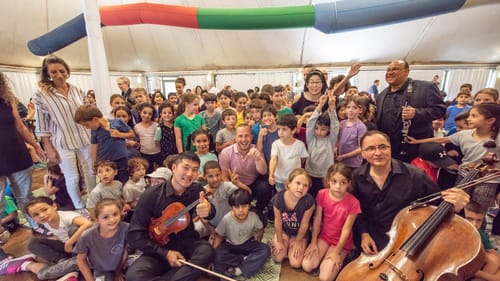Stay in the Loop
BSR publishes on a weekly schedule, with an email newsletter every Wednesday and Thursday morning. There’s no paywall, and subscribing is always free.
Take it to the streets
The Philadelphia Orchestra and "sacred spaces"

The Philadelphia Orchestra’s just-concluded tour of Germany, Austria, and Israel has been the most controversial in its history. No, visiting Germany, where a resurgent right wing openly invokes the symbols of Nazism, wasn’t the problem. Rather, it was Israel, where survivors of the Holocaust found their only unqualified refuge after the defeat of Hitler.
Who made the fuss? Palestinian activists and their sympathizers, galvanized by the Great March of Return: the weeks-long effort, sponsored by Hamas and underwritten by Iran, to breach the Israeli-Gaza border and “reclaim” Israeli territory for, among others, armed Hamas cadres.
Whose rights matter?
I don’t want to litigate the Israeli-Palestinian question. Nor do I uncritically defend Israel, which has its goodly share of flaws and problems. But it is not a one-party state that has stifled the freedom of a fifth of the earth’s population. That’s China, where the Philadelphia Orchestra has performed to acclaim and without incident, where nobody expected the company to embrace dissidents or ask its hosts embarrassing political questions.
The larger question here is whether artists should have a right to perform without disruption, let alone without fear for their safety. The latter issue was thrust upon us this spring at the Wilma Theater, where a spectator menacingly interrupted a performance he didn’t like.
People have the right to protest cultural events they don’t like, as they do anything else. But that right stops at the auditorium door. Audiences may boo, hoot, or jeer performances. But if their problem is political, they need to take it into the street.
Brahms or bust
Benjamin Safran, writing in BSR, says, “Screw the sanctity of the concert hall.” And why not that of the church, synagogue, or mosque? Why not any social gathering where you can command a captive audience for a few minutes on behalf of whichever cause you think people should pay attention to?

I have felt passionately enough in my time to harangue strangers publicly about things I thought should matter as deeply to them as they did to me. I have never thought to do it to people listening to Brahms's First Piano Concerto. It could be, as Mr. Safran suggests, the elitist snob in me.
I don’t know what Brahms thought about Bismarck, or what he might have thought about the Vietnam War. I care very much, though, about how he chooses to modulate from one key to another or where he brings in the horns. When a genius is good enough to give you his innermost thoughts clothed in beauty, you have a more-than-constitutional right to give them your close attention.
If the interrupted Brahms performance had been conducted by Herbert von Karajan rather than Yannick Nézet-Séguin, I wouldn’t have been in the audience. Karajan was an unrepentant Nazi. I might have protested his engagement by the orchestra in the street. I wouldn’t have cut in on Brahms, though. Some spaces really are sacred, or at least off limits.
Yes, music can be used for political purposes, including the worst: think of Wagner at Nuremberg. But great music, performed at the highest level by musicians giving their hearts to it, not only deserves but demands the respect we give ourselves. That’s because if we don’t give it, we only lessen our own worth.
To read Benjamin Safran's essay on the Philadelphia Orchestra's tour of Europe and Israel, click here.
Sign up for our newsletter
All of the week's new articles, all in one place. Sign up for the free weekly BSR newsletters, and don't miss a conversation.

 Robert Zaller
Robert Zaller